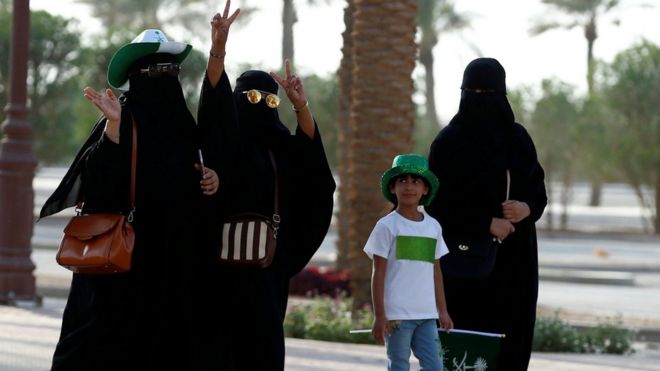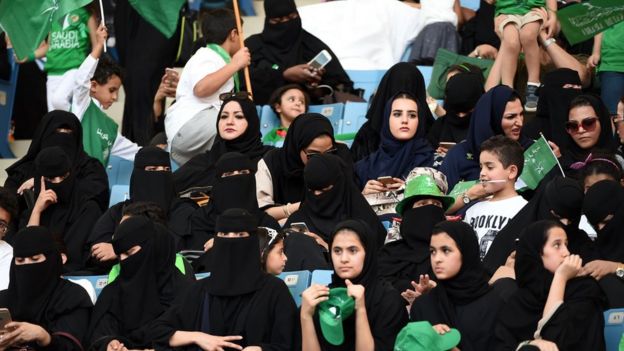Princess Basma Bint Saud Bin
Abdulaziz tells the BBC there are many changes she would like to see in Saudi
Arabia - but that now is not the time for women to be allowed to drive.
I speak as the daughter of King Saud, the former ruler of Saudi Arabia. My
father established the first women's university in the kingdom, abolished
slavery and tried to establish a constitutional monarchy that separates the
position of king from that of prime minister. But I am saddened to say that my
beloved country today has not fulfilled that early promise.
Our ancient culture, of which I am very proud, is renowned for its nobility
and generosity, but we lack, and urgently need, fundamental civil laws with
which to govern our society.
As a daughter, sister, (former) wife, mother, businesswoman and a working
journalist, these are the things that I would like to see changed in Saudi
Arabia.
 Princess Basma is divorced and
lives with her children in London
Princess Basma is divorced and
lives with her children in London
I would like to see a proper constitution that treats all men and women on an
equal footing before the law but that also serves as a guide to our civil laws
and political culture.
For example, today in Saudi courts, all decisions are made according to the
individual judge's interpretation of the holy Koran. This is entirely dependent
on his own personal beliefs and upbringing rather than universally agreed
principles or a written constitution as a guide.
I am not calling for a western system but an adaptation of that system to
suit our needs and culture. Thus our constitution should be inspired by the
philosophy of the Koran with principles that are set in stone and not open to
the whims of individual judges as is the case now.
In particular, the constitution should protect every citizen's basic human
rights regardless of their sex, status or sect. Everyone should be equal before
the law.
I strongly believe that current divorce laws are
abusive.
Today in Saudi, a woman can ask for a divorce only if she files for what is
called "Khali and Dhali". This means either she pays a big sum of money running
into tens of thousands of dollars or she has to get someone to witness the
reason why she is filing for a divorce - an impossible condition to fulfil given
that such reasons usually are the kind that remain within the four walls of a
marriage.
Another way to keep a woman in the marital home against her will is the
automatic granting of custody of any children over the age of six to the father
in any divorce settlements.
This state of affairs is in complete contradiction to the Koran, upon which
our laws are supposed to be based. In it a woman is given full rights to divorce
simply in the case of "irreconcilable differences".
The way women today are treated in Saudi Arabia is a
direct result of the education our children, boys and girls, receive at
school.
The content of the syllabus is extremely dangerous. For one, our young are
taught that a woman's position in society is inferior. Her role is strictly
limited to serving her family and raising children. They are actually taught
that if a woman has to worship anyone other than God it should be her husband;
"that the angels will curse her if she is not submissive to her husband's
needs". Girls are also strictly forbidden from taking part in any physical
education. This is a result of a complete misinterpretation of the Koran. I
consider these ideologies to be inherently abusive.
Aside from that, the focus in most of our educational system is on religious
subjects such as hadith (sayings attributed to the prophet), Fiqh (Islamic
jurisprudence), tafssir (interpretation of the Koran) and of course the Koran.
The attitude is that "learning itself, anything other than religion won't get
you into heaven so don't waste your time". I would like to see religious
teaching limited to the Koran and the Sunna (the way the prophet lived), where
the true ethics of Islam lie. The rest is blind rote learning of the most
dangerous kind. It has left our youth vulnerable to fundamentalist ideologies
that have led to terrorism and abuse of the true meaning of the Koran.
Instead of wasting our youths' intellect on memorising quotations whose
origins is uncertain (such as those found in hadith, Fiqh and tafssir) we need
to encourage them to think freely, innovate and use their initiative for the
betterment of our society. Early Islam was a time of great creativity. Scholars
excelled in sciences and literature. Our religion should not be a shield behind
which we hide from the world but a driving force that inspires us to innovate
and contribute to our surroundings. This is the true spirit of Islam.
The ministry of social affairs is tolerating cruelty towards women rather
than protecting them. The only refuge homes that abused women can turn to are
state ones. In these, women are continuously told that by seeking refuge they
have brought shame on their families.
If they come from powerful families then they will be
sent straight back to their homes in fear of the wrath of a powerful patriarch.
As a result we have seen many cases of suicide by educated women, doctors and
scientists who were sent back to their abusers.
We need independent women's refuges where the rights of women are upheld and
backed up by powerful laws that can override family traditions and protect
women.
The ministry of social affairs not only abuses women's rights but is also one
of the reasons poverty is rife in the kingdom. A corrupt system that lacks
transparency has meant that more than 50% of our population is poor and needy
even though we are one of the wealthiest countries on earth.
Women in Saudi cannot get around or travel without a mahram (a kind of
chaperone - usually a male relative).
At the time of the prophet, women used to have a man to accompany them but in
those days Arabia was a desert literally full of pirates.
Today the only purpose of such a law is to curtail women's freedom of
movement. This not only infantilises women but turns them unnecessarily into a
burden on their men and on society.
Today women in Saudi Arabia are not allowed to drive.
This one seems to concern western observers the most but
I hope you will agree having read the previous five that there are more
essential rights we need to obtain first.
I am definitely for women driving but I don't think this is the right time
for a reversal of this law. In the current climate if a woman drives, she could
be stopped, harassed beaten or worse to teach her a lesson.
This is why I am against women driving until we are educated enough and until
we have the necessary laws to protect us from such madness. Otherwise we might
as well hand out a licence to the extremists to abuse us further. If as drivers
we get harassed, they will say to the Islamic world "see what happens when women
drive, they get harassed they get beaten" and they will call for even more
stringent laws to control women. This is something we can't afford. Fundamental
changes in the law and its attitude to women are needed before we take this
step.
On the whole it is the rights and freedoms of all citizens that are crucial
in Saudi Arabia and from those the rights of women will emanate.
Princess Basma Bint Saud Bin Abdulaziz spoke to Outlook
on the BBC World Service
.
Princess Basma
- Youngest daughter of the country's second king and niece to its current ruler
- Educated in Britain and Switzerland
- Lives in Acton, London
- Princess Basma, pictured above pointing to her place in the Saudi family tree, was interviewed by Outlook on the BBC World Service
An insular kingdom
- Established in 1932 by King Abd-al-Aziz
- One of the most devout and insular countries in the Middle East
- The royal family is 15,000 strong
- The Al Saud dynasty holds a monopoly of power; political parties are banned
- Saudi women live a restricted life and are banned from driving
- The country includes the Hijaz region - the birthplace of the Prophet Muhammad and the cradle of Islam
- Saudi Arabia sits on more than 25% of the world's known oil reserves
 REUTERS
REUTERS

